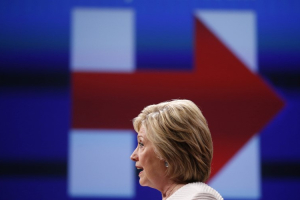A coalition of 26 black pastors and religious leaders have delivered a letter to Democratic presidential candidate Hillary Clinton criticizing her attacks on religious freedom, voicing concern over her stance on abortion, and warning her not to take the black vote for granted.
According to the Washington Times, on Monday afternoon, Dr. Jacqueline C. Rivers, the executive director of the Seymour Institute for Black Church and Policy Studies in Boston, presented "An Open Letter to Hillary Clinton Regarding Religious Freedom for Black America" to Clinton Campaign Headquarters in Brooklyn.
In the letter, the faith leaders request a meeting with the Democratic hopeful "to discuss some of the critical issues in the black community: education and employment, religious freedom, violence, and justice for the unborn."
"We urge you to accord the Black Church the same respect that would be conferred on wealthy white donors by meeting with our internationally recognized leaders," reads the letter. "Those who would oppose our right to live by the teachings of the Bible set themselves against the interests of the poor."
Following a section on employment and education, the authors move on to to the "catastophic" impact abortion has had on the black community, pointing to sobering statistics.
"Nationally there are 365 black babies aborted for every 1,000 that are born. Blacks account for roughly 38% of all abortions in the country though we represent only 13% of the population," they wrote. "In New York City, the situation is absolutely dire. According to a report prepared by the city's Department of Health and Mental Hygiene, in 2013 there were more abortions among black women in the city, 29,007, than there were black babies born, 24,108."
The leaders took offense to comments made by Clinton in a 2015 speech, in which she stated that "deep-seated cultural codes, religious beliefs and structural biases have to be changed..." Such comments are "reminiscent of totalitarianism," argues the coalition.
In a pointed appeal, the authors ask Clinton, if black lives matter to her when it comes to abortion.
"In 2008, Secretary Clinton, you took the position that abortion should be rare, and you emphasized 'by rare I mean rare,'" reads the letter. "But Black babies are dying at terrifying rates. How do you justify your unconscionable silence in the face of such destruction of innocent black life? Don't black lives matter? What policies would you pursue as president to reverse the soaring abortion rates among black women?"
The authors also criticize Clinton's "open contempt for religious freedom within your own campaign" expressed when "key players on your staff have sought to subvert Catholic teaching on sexuality by planting externally funded groups in the church to advance a politically correct agenda."
"What would you do as president to guarantee that religious freedoms are balanced against civil rights rather than being trumped by them?" the authors ask. "Will black pastors and intellectuals be free to lead and guide our communities in accordance with our widely accepted faith-based knowledge tradition?" they ask.
"We request that you set a place and time, during your first 100 days in office, where we may meet to learn more about your position on these issues," the letter reads. "Then we will be better able to inform our community about what they can reasonably expect from a Clinton administration."
The letter is signed by leading black clergy, activists and intellectuals from across the U.S., all of whom are Democrats and independents, including Bishop Frank M. Reid III, the chair of the social justice committee for the African Methodist Episcopal Church and Bishop Charles E. Blake, the presiding bishop of the Church of God in Christ.
In most polls, more than 90 percent of black voters support Clinton over Republican presidential candidate Donald Trump. However, early voting suggests that turnout among black voters is unusually low this year; Newsweek pointed out that only 15 percent of the early voters in Florida are African-American, compared to 25 percent in 2012, and the New York Times reported that black turnout has fallen 16 percent in North Carolina since 2012 even as white turnout has increased by 15 percent.

















